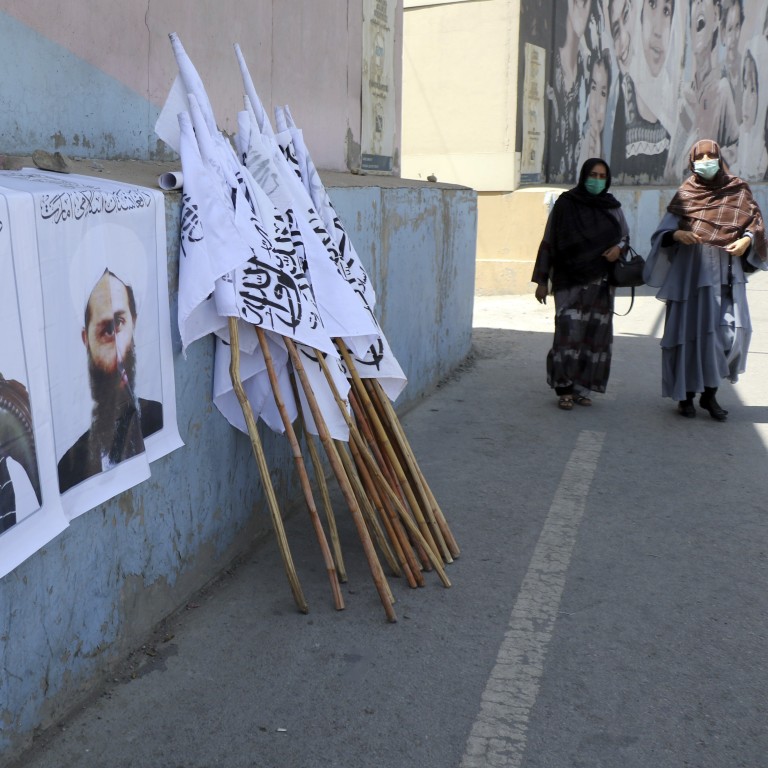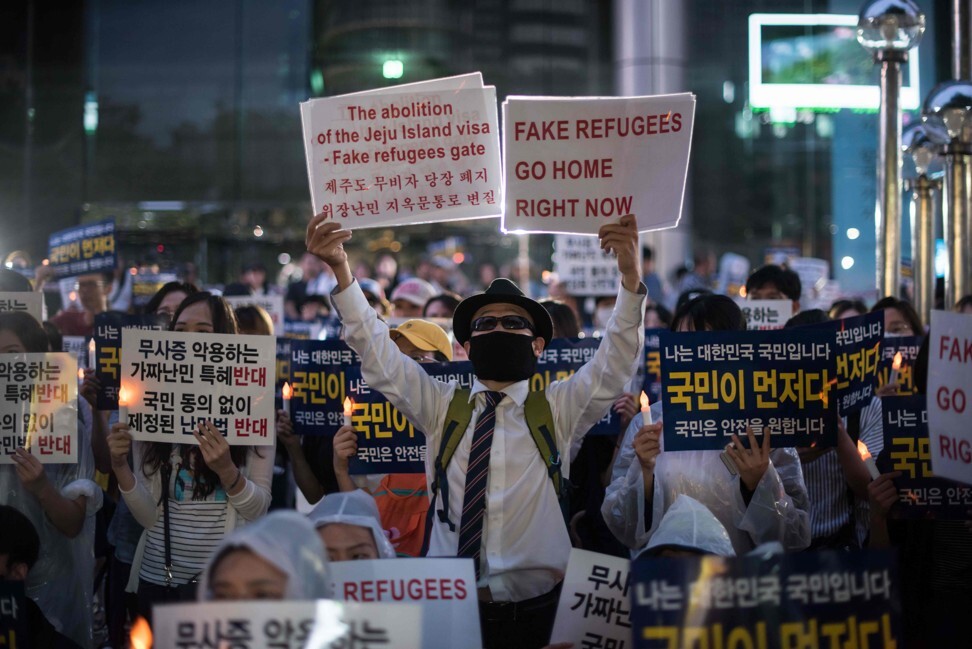
‘Taliban kill women like me’: Afghans in South Korea say they don’t want to go back
- Seoul has allowed 430 Afghans currently in South Korea to stay temporarily and granted permanent resettlement to 391 Afghans evacuated from Kabul
- Domestic opposition to refugees is still rife and is now largely fuelled by economic concerns due to the pandemic
As a woman who chose to study abroad alone, without a husband or male family member to watch over her, Samet has no doubt she would be marked out as a sinner by Afghanistan’s new Islamist rulers, who took complete control a fortnight ago while the United States was in the final stages of winding up its two-decade military presence in the country.
“They just see all the people who are abroad or want to go abroad as sinful people, and if they get a chance to get revenge or kill any of the people like me, they do,” said Samet, who requested to use a pseudonym.
Despite pledges by the Taliban to uphold the rights of women and other groups, the United Nations has sounded the alarm over the “serious human rights concerns and situation” in the country. A spokesperson for the militant group earlier this week said women should temporarily stay at home for their own safety as some of its fighters had not been trained in “how to deal” with the opposite sex.
On Thursday, suicide bombers killed dozens of Afghan civilians and at least 13 US service members in an attack outside Kabul Airport that was claimed by an affiliate of the terrorist group Islamic State.
Afghanistan: what is Isis-K and how dangerous is the Islamist group?
Samet is safe for the time being, after South Korea this week announced the country’s small Afghan community would be granted special stay permits due to humanitarian considerations. Their reprieve, however, is officially temporary, and the government has guaranteed their stay only until the situation in Afghanistan has “stabilised”.
Seoul on Thursday separately evacuated 391 Afghans who had assisted with its contributions to Afghanistan’s post-US-invasion reconstruction, providing them with permanent resettlement as “persons of special merit”, a rare gesture from a country that has little history of mass immigration and rarely accepts refugees.
For the roughly 430 Afghans already living in South Korea on temporary visas, the uncertainty is worrying.
South Korea wary of US plan to use military bases to process Afghan evacuees
“After everything calms down and the Taliban start their regime and if Korea legitimises them, they may ask us to leave,” Samet said. “Sending me back home would be the worst Korea can do to me and people like us.”
Between 1994 and 2018, according to government data, the country accepted 839 of the 40,000 applicants for asylum – little more than 2 per cent. Authorities last year recognised just 44 refugees, an all-time low acceptance rate of just 0.8 per cent.
In 2018, the arrival of hundreds of asylum seekers from Yemen on the popular resort island of Jeju sparked protests and petitions to toughen the country’s already strict related rules. Authorities ultimately denied refugee status to all of them, and tightened a visa exemption for the island to exclude arrivals from the Middle Eastern country.
Anti-Asian hate: in South Korea, reports of attacks on Asian-Americans focus on suspects’ race
Some online commentators raised alarm about the threat of Islamic terrorism, and stressed the need to look after South Koreans struggling during the Covid-19 pandemic ahead of foreigners.
In a survey of 1,016 Korean adults commissioned by the Office of the United Nations High Commissioner for Refugees in late November last year, 53 per cent of the respondents were against the country receiving and protecting refugees, compared to 33 per cent in favour.
Respondents were given the option of citing multiple reasons for opposing refugees: 64 per cent cited the financial burden to the country; 57 per cent said they were worried about crimes; 46 per cent cited differences in culture and religion.
Vietnamese wives, internet brides bear brunt of ageing Korea’s aversion to immigration
South Korean President Moon Jae-in, a son of North Korean refugees, encouraged the public to welcome Afghans who had helped the country, describing Seoul’s resettlement flight – code-named Operation Miracle – as “our moral responsibility”.
Park Kyung-tae, a sociology professor at Sungkonghoe University in Seoul, pointed out that South Korea has had a refugee law since 2013.
“It is the country’s obligation to help refugees,” he said. “It is, however, very hard to be recognised as a refugee in Korea.”

01:45
Photos of women outside Kabul salons defaced after Taliban seizes Afghanistan
Park said economic factors were likely to greater source of opposition to refugees than outdated ideas of racial purity.
“The claim that we are a single race or ethnic group is no longer convincing,” he said. “Rather, the growing inequality and the resulting deprivation and frustration are the causes of anger against others.”
Karim Hamza, who works for an environmental non-profit in Seoul, said South Korea had a long way to go to become a multicultural society.
“Especially if you are Afghan, they do not say you are Afghan, they say you are Muslim,” said the 28-year-old, who also asked not to use his real name. “I don’t know, Islam is just written on our face. They think we are the Taliban, they think we are the problem.”
Bangladesh ‘on alert’ for militants amid Taliban’s takeover of Afghanistan
Hamza said although Afghans were grateful to receive a temporary extension of stay, he hoped the government would consider a long-term solution for the community.
“We want the Korean government to give us some psychological support,” said Hamza, who moved to South Korea on a scholarship to study Korean in 2013. “If you extend my visa by one month, do you think I can sleep at night?”
Hamza, whose family in Afghanistan has fled to Iran since the Taliban’s return to power, said Afghans such as him posed no threat to South Korea.
“It is very, very easy for [the Korean government] to support us and let us live here long term and make our future more clear, so we can focus on our future and dreams,” he said. “Me and so many of my friends came here to work and study, to dream, like any other young guy.”


